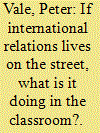| Srl | Item |
| 1 |
ID:
132914


|
|
|
|
|
| Publication |
2014.
|
| Summary/Abstract |
The argument asserts that International Relations (IR) was (and remains) constructed to serve the interests of the knowledge courts of the north. In South Africa, the discipline is an 'alien species' because the imported idea of sovereignty not only disrupted natural patterns of regional migration, but the formation of the region's first state, the Union of South Africa, divided the country's people on the grounds of race. The coming of the Union followed upon both the Jameson Raid (1895/1896) and the Boer War (1899-1902) - the former was of interest to E.H. Carr in two instances but only as an attempt to explain events in the global north. The 'new' politics of southern Africa, which were based on sovereignty and the rise of Afrikaner Nationalism were ignored by Carr. The migration of IR to South Africa in the 1930s rested in an imperial frame, and the discipline helped create a European state in Africa. The author uses several autobiographical examples to suggest his own dissatisfaction with this condition by using Carr's notion of 'site-specificness'. The primacy of English in IR is critiqued because this language closes off perspectives of the international which are carried in other languages. The article concludes with a discussion of the way in which 'First People' are excluded by the deliberations around IR.
|
|
|
|
|
|
|
|
|
|
|
|
|
|
|
|
| 2 |
ID:
158160


|
|
|
|
|
| Publication |
New Delhi, Oxford University Press, 2018.
|
| Description |
xx, 532p.: figures, tableshbk
|
| Standard Number |
9780199480135
|
|
|
|
|
|
|
|
|
|
|
|
Copies: C:1/I:0,R:1,Q:0
Circulation
| Accession# | Call# | Current Location | Status | Policy | Location |
| 059355 | 355.033054/GAN 059355 | Main | On Shelf | Reference books | |
|
|
|
|
| 3 |
ID:
116528


|
|
|
|
|
| Publication |
2012.
|
| Summary/Abstract |
In this paper we apply a simulation model of a village economy in Guizhou province, China, to assess impacts of trade reform at the household and the village level under alternative land market regimes. Putting special emphasis on the modeling of household migration a trade reform scenario is simulated with and without the existence of a land rental market in the village.
Significant impacts of the land market on the policy outcome regarding household production, income and welfare are found. The possibility to trade land within the village leads to increasing specialization into agriculture and migration among the households as a response to the policy shock. In a situation with a land market, incomes of households which expand agricultural production are less negatively affected by trade reform than incomes of households which migration more.
At the village level, a land market does not influence the poverty outcome of the reform but reduces its inequality enhancing impact. Village migration and exports of agricultural outputs increase.
|
|
|
|
|
|
|
|
|
|
|
|
|
|
|
|